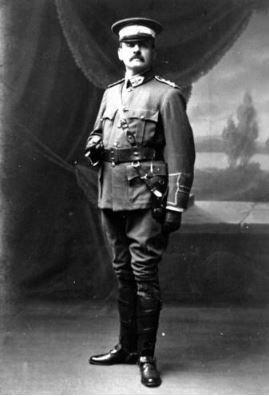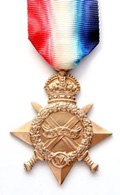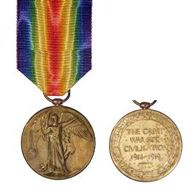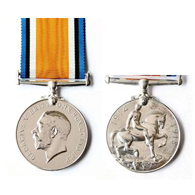HARTE Albert Edward
-

- Major
- Major
- Captain
- Buderim
- Yes
- 11 November 1862
- England
- 3 August 1914
- Kanowna
- 4 August 1914
- Brisbane
-
Albert Edward Harte was born on 11 November 1862 in England and was educated at Queen Elizabeth Grammar School, Ipswich, England.
He married Isabella Louisa Towner on 8 October 1885 in Queensland. They had three children during their marriage. Hilda Louise Harte 1887, Florence Ellene 1888, Norman 1891.
The Commonwealth of Australia Gazette No.37 Friday, 26 July 1901 Reads: Lieutenant Albert Edward Harte, of the Queensland Volunteer Rifles, to be an Acting Lieutenant in the Queensland Defence Force (Land), to date from 1st March 1901.
PRESENTATION TO MR HARTE
Mr. A. E. Harte, the late secretary of the Queensland National Agricultural and Industrial Association, was last week the recipient of a presentation which the committee of the association made to him as a testimony of their appreciation of his services, and of their regret that he had found it necessary to sever his connection with the association. The presentation was made in the office of the association. The chairman of the association (Mr. J. Macdonald) said that they had officially said goodbye to Mr. Harte on a former occasion. This day they had asked him to meet them for a special purpose, and he would ask them to drink success and prosperity to Mr. Harte. He had acted as secretary to the association for 19 months, and the success of the association during that period was very largely due to him, through no doubt the council could claim some credit to themselves. He (the chairman) had always admired the admirable tact and attention to details which Mr. Harte had always displayed on every occasion. To show as an example the appreciation in which Mr. Harte was held, he would mention that in 1902 the Press as a recognition of his courtesy had made him a presentation. They all expressed deep regret at his leaving them, and wished him every success in his future career. He read: a letter from the council, signed on behalf of the association. The letter read as follows: "At the last meeting of this association, held on September 10, it was resolved that a letter be forwarded to you conveying council’s unanimous approval of the manner in which you had administered the affairs of the association during the 19 months you held the position of secretary. Your marked ability and enthusiasm in your work, combined with your admirable tact and powers of organising, caused the general admiration of all concerned. Now that you have of your own accord severed your connection with our association, we desire to express our regret at losing you, but at the same time we would ask you to accept our best wishes for your future, in which we are sure all subscribers of our association will heartily join."
The gift was a very handsome one consisting of a gold watch, the cover engraved with Mr. Harte’s monogram, a chain, and pencil-case. An inscription within the casing read. "Presented to Albert E. Hart”, Esq., from the National A. and I. Association of Queensland: Brisbane. September, 1903." The watch was obtained from Messrs. Hardy Bros., who also had the inscription very artistically completed. Mr. Harte expressed thanks for the testimony he had received of the association's appreciation of his services through their gift. He was not quite taken by surprise at the intention of the association to give him something: as an appreciation of his services but he had not thought that it would have taken so handsome a form. He had found it necessary to alter his course of life, though on entering the service of the association he had hoped to long remain in it. Reasons had been assigned for his leaving which were quite untrue. One was that he had disagreed with the council, and another rumour be heard from Gympie. There, he had heard that it was asked how much he was in default. (Laughter.) He had always been in perfect agreement with the council; as to the other, that was not the position. (Hear, hear.). Mr. Harte referred to several matters of interest to the association, and spoke highly of the services of Mr. C.A. Arvier, acting secretary, and of Mr. Oxley and others connected with the association. The Week (Brisbane), 2 October 1903. The Electoral Roll of 1905 lists Albert working as a clerk and living at the Union Club, Charlotte Street, Brisbane, Queensland. The Electoral Roll of 1913 lists Albert as an Accountant living at Vulture Street, Brisbane, Queensland.
1914 - MOBILISED FOR WAR SERVICE
On 3 August 1914, Albert was detailed in Brisbane for Service as Supply Officer, Thursday Island. He left Brisbane for Townsville. On 4 August he reported there to Chief Officer Thursday Island Defences and proceeded by Kanowna with mobilized troops. Albert was described as being 52 years old and married. He gave his father, Maurice Atkin Harte, Birkdale near Brisbane as his next of kin. He was employed as an Accountant Stock and Share Broker.
Rank Captain
EXPEDITIONARY FORCE - The Australian Government decided to send an expeditionary force to occupy Rabaul, the capital of German New Guinea. Apart from a battalion raised in Sydney, a volunteer citizen force, called the Kennedy Regiment was hurriedly put together in North Queensland. On 8 August 1914, the AUSN liner Kanowna, which was operating on the east coast service, arrived in Townsville, and was commandeered to carry the Kennedy Regiment to New Guinea.
The troops boarded the ship amid chaotic scenes, and it departed at noon, receiving a most enthusiastic farewell. Kanowna went first to Thursday Island, where more troops were embarked, then proceeded to Port Moresby to await the arrival of the troopship coming from Sydney with an escort of warships.
Meanwhile in Sydney the departure of the troops proceeded in a more orderly and professional manner. The P & O liner Berrima was requisitioned to carry the troops while on 7 August the coastal liner Grantala was taken over for conversion into Australia’s first hospital ship, to accompany the expeditionary force. Grantala belonged to the Adelaide Steamship Company.
The British Admiralty had envisaged that, in the event of war breaking out with Germany, a hospital ship would be required for the Pacific Fleet, and the necessary equipment had been sent out to Sydney. Grantala was taken to the Garden Island Naval Base in Sydney Harbour where the medical equipment was fitted.
The Sydney Battalion left on 19 August aboard the Berrima, escorted by a Royal Australian Navy cruiser HMAS Sydney, going first to Palm Island. Their they were joined by another cruiser, two destroyers and the submarines AE1 & AE2. On 2 September this force left Palm Island for Port Moresby where Kanowna was waiting for them to arrive.
Grantala did not leave Sydney until 30 August, and steamed directly to Port Moresby to join the other ships already there. Shortly afterwards all the ships left for Rabaul, but now the situation turned to farce.
Soon after leaving Port Moresby there was a mutiny among the firemen on board Kanowna, who refused to take the ship any further, volunteers to do the job were drawn from the troops on board, and the ships had to return to Port Moresby.
The troops on board Kanowna were then inspected by the overall commander of the contingent, who concluded they were not fit for active service being poorly trained and equipped. As a result, on 7 September Kanowna left Port Moresby and returned to Townsville, where the troops all disembarked. Kanowna then steamed south to Sydney, where it was released, resuming its place in the coastal trade on 13 October.
The rest of the ships went on from Port Moresby to Rabaul, which was captured on 13 September. Grantala carried the wounded and sick to Suva remaining there until December.
Demobilized - Albert being demobilized, he returned to Brisbane arriving there on 29 November 1914.
APPLICATION FOR A COMMISSION IN THE AUSTRALIAN IMPERIAL FORCE
On 1 March 1915 he enlisted with the 7th Infantry Brigade Train, Army Service Corps, 17th Company.
Albert embarked at Brisbane per HMAT A11 Ascanius on 24 May 1915. Arriving Suez 30 June 1915. Unit at embarkation 17th Company A.A.S. C. (Australian Army Service Corps) 7th Infantry Brigade.
20 March 1916 proceeded to join B.E.F. at Alexandria. Disembarked Marseilles 28 March 1916. Saw active service in Egypt 24 June 1915 to 18 March 1916. France and Belgium March 1916 to August 1917. Transferred to 20th Company on 21 August 1916.
Albert was appointed to the rank of Major on 24 March 1917.
Captain (T/Major) Albert Edward Harte - Mentioned in Dispatches 9 April 1917. Exceptionally good services as Officer Commanding 9 Brigade Train Coy., from 2nd July 1915 and as Officer Commanding Headquarter Coy., from 21st August 1916 to present date, and consistent devotion to Duty. 6 July 1917
LETTER From: Major A. E. Harte, 20th Australian Army Service Corps A.A.S.C. To: C.O. 2nd Australian Div. Train Subject: Application for leave to Australia.
Following on the interviews which you have been good enough to grant me recently on the above mentioned subject, I now beg to respectfully apply that same may be granted to me for such period as may be thought fit.
Attached hereto is a letter dated 19 May 1917, from my attorney in Brisbane, Mr. J. P. MacFarlane. The 2 marked paragraphs particularly show that the position of my business is such that the personal attention is very necessary. My attorney, will I know do his best for me, but I wish to dissolve the partnership. Being 54 years of age, it is of great importance to me that the business should not go so far to the bad that I might practically have to make a fresh start later on. Outside the business I have a fruit farm and other interests requiring my attention.
My father is 88 years of age. Correspondents tell me that he builds greatly on the hope of seeing me again. I mention this because it certainly influences me a good deal in my desire for leave.
My service during the War is 4 months as Supply Officer at Thursday Island, about 4 months as Supply Officer at Enoggera Camp until appointed to command 17th Coy., A.A.S.C. in August 1916. Therefore I shall have completed 3 years continuous active service. Since serving in the AIF I have been absent from my company twice – 10 days leave on each occasion to the UK.
I am particularly anxious that I may be allowed to return to duty without delay and desire to again assure you that I would not make the application unless I conscientiously believed it to be justifiable.
I shall be glad if Mr. MacFarlane’s letter can be returned to me please. Permit me to seek your kind consideration of my application. I sincerely hope that you will see your way to further it. Albert E. Hart, Major. O.C. 20th A.A.S.C. 17 July 1917 – Headquarters 2nd Australian Division
I am to inform you that the G.O.C. does not approve of leave of absence, but under the circumstances related, no objection will be raised to Major Harte being returned to Australia “for termination of appointment at his own request”. This officer is no longer young and might not stand another winter campaign. 25 July 1917
LETTER From: Major A. E. Harte, 20th A.A.S.C. To: C.O. 2nd Australian Div. Train Subject: Application to terminate appointment on return to Australia.
Following upon the rejection of my application for leave to visit Australia as notified in Headquarters of 17 July 1917, I now respectfully request that I may be returned to Australia for termination of my appointment.
6 August 1917 - Approval is given to the return to Australia for termination of appointment at his own request. Please send him to report to AIF Administrative Headquarters for passage.
On 13 August 1917 Albert left France and proceeded to England for return to Australia. He embarked from England on 25 August 1917 per troop transport A24 Benalla.
On 10 September 1917 his NOK was advised of his return to Australia. He disembarked at 2 Military District on 26 October 1917 thence overland to Brisbane.
DISCHARGED – Albert was discharged in Brisbane on 11 November 1917, his 55th birthday
He received the1914/1915 Star, British War Medal and Victory Medal.
SOUTH BRISBANE – MAJOR HARTE, THE NATIONAL CANDIDATE
A well-attended meeting of representatives of the National Party, the Returned Soldiers, and Patriots' National Political League, and the Queensland Women's Electoral League held in , South Brisbane last night, Major Albert E. Harte was unanimously endorsed as the national candidate for the South Brisbane electorate. Alderman Davey and Mr. Montefiore, who had retired in favour of Major Harte, were accorded a hearty vote of thanks for their unselfishness. All present, with power to add to their number, formed themselves into a committee to further Major Harte’s Candidature. Darling Downs Gazette, 21 February 1918. Albert died on 6 May 1937.
DEATH OF PROMINENT FINANCIAL IDENTITY - Mr. A. E. HARTE’S CAREER
Mr. Albert E. Harte, who had been ailing for some time, died at his residence at New Farm late yesterday afternoon. His passing robs Brisbane of a prominent figure in its business life and of one who was a particularly fine type, of citizen. Born in Somersetshire, England, 74 years, ago, the deceased gentleman came to this country when he was only 13 years old. When he was still in his teens he joined the staff of the "Daily Northern Miner" at Charters Towers under the late Mr. Thadeus O'Kane, one of the most original characters in journalism in Australia. Charters Towers then was in the hey-dey of its prosperity and it was only natural that the young Englishman should be attracted towards the stock exchange business. He entered into partnership with the late Mr. Richard Tregaskis in a mining brokerage business. Later he became a member of the firm T. B. Bearup and Co., there.
BRISBANE ASSOCIATIONS. Coming to Brisbane, the late Mr. Harte became secretary of the Stock Exchange Club, and in 1902 he was appointed secretary of the National Agricultural and Industrial Association, but he resigned this a year later and became the first manager of the newly established "Daily Mail."
Later Mr. Harte conducted a real estate and commission, agency, and when the war broke out he went to the front as captain and returned as major, being, mentioned in dispatches. After the war the deceased gentleman resumed business as a stock and share broker and accountant, in which Mr. Paul A. Hoge joined him as partner. He was president of the Stock Exchange in 1920 and 1921, and was a vice-president of the Queensland branch of the Chartered Institute of Secretaries (England). He also was a member of the Rose Croix Masonic Lodge and of Booroodabin Bowling Club, and honorary representative of the Barnado Homes here. Mrs. Harte survives her husband, as also do two daughters— Mesdames H. Millingen and A. Chrystal, both of Sydney.
The funeral takes place from St. Michael's and All Angels' Church, New Farm, to the Crematorium, at 2.45 p.m. to-day.
The funeral of Major Albert E. Harte, on Friday (7 May) afternoon, was at tended by relatives in Brisbane and a large number of friends. The service was conducted by Canon W. Thompson, and members of the committee of the Brisbane Stock Exchange acted as pall-bearers. At the morning call of the Stock Exchange on Friday the president (Mr. A. D. Abercrombie) and other members expressed tributes of esteem for the late Major Harte, and, as a mark of respect for his memory, the members stood in silence for a minute. The afternoon call was cancelled. The late Major Harte's membership of the Brisbane Stock Exchange extended over 35 years, during which period he was president in 1920, 1921 and 1927. He represented the exchange at the Australian Stock Exchange conferences in 1922, 1925, and 1927.
-

-

-

- Returned to Australia
- 25 August 1917
- 6 May 1937
- At his residence - New Farm
-
National Archives. Australian War Memorial. Queensland Electoral Rolls. The Week (Brisbane), 2 October 1903. Darling Downs Gazette, 21 February 1918.
- Helene Cronin





